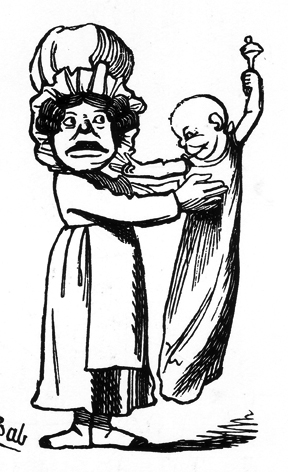Scientific Studies in the Effect of Opera on Babies
By Frank Behrens
ART TIMES May/ June 2010
 |
Since there is no more April issue of this journal, I wrote a May Fool article, going on the proposition that anyone who can be fooled in April can still be fooled in May.
Some time ago, publicity people for recording companies came up with the idea—and this is not made up--that playing Mozart for babies would make them smarter. (The babies, not the recording publicity people.) All this without defining “smart”; but if the publicists define their terms, their claims would be too obviously loopy. After all, who knows if these babies would have been just as smart had the parents never played Mozart? Couldn’t there be a Louis Armstrong Effect as well as a Mozart Effect?
Ah, but would one Effect affect babies in the same way as another Effect? And one must not fall into the post-hoc-ergo-propter-hoc fallacy: after it, therefore because of it. However, for the purposes of this essay, let us agree that wee ones hearing Mozart often in their early years do become smarter than they would have been had no Mozart been played at all. We can suppose that? We can suppose anything, so why not that?
Where the publicists fell short was in not realizing how SPECIFIC music can influence the development of ANY child in specific ways not necessarily connected with intelligence. For now, let us concentrate on operas—mostly Mozart, as they say in Lincoln Center.
An experiment carried out at some institution that refuses to be identified worked like this. 700 babies of both genders were subjected to nothing but “The Magic Flute” throughout most of their waking hours. 18 years later, out of the 213 of those who were still alive and/or could be found, no less than 187 either played wind instruments or collected bird cages (some with birds, mostly without). Also 170 were Masons, although one of them was invited to leave after he claimed that he was the Queen of the Night.
Now this should be remarkable enough; but what follows is even more fascinating. Using a recording of “Don Giovanni,” a control group of 300 male babies were played only those sequences sung by Don Giovanni himself. Results: out of the 110 who could be located 18 years later, 38 had been arrested for rape, divorced for abusing their wives, or had subscriptions to naughty magazines. That is a 34.5% result, plus or minus a 33% error.
Similar results were obtained when “The Marriage of Figaro” in its entirety was played to 300 male and female babies, while a control group of 300 heard only the parts of the score sung by the Countess. Of the first group, 200 of which could be interviewed, 158 had become hairdressers, while 57 males became or posed as Spanish Counts. Of the second group, 24 of the females had (by the age of 18) a younger boy hidden in their closet, 49 of the females found that their husbands had maids hidden in the gardens, and none of the males seem to be affected at all.
Even more interesting are the comments of Dr. X (who either refuses to be identified or has the shortest name of anyone I know) of the Gotterdammerung Institute for Things Like That. He noticed that among the babies subjected to the last two Mozart works, not a single one ever had the slightest inclination to learn Italian! (Those that were Italian refused to speak it.)
Golly, how did the record companies miss all that?
On a smaller scale, I know of one case in which a male baby heard his parents playing “Siegfried” every day for years. As a young adult, he was notorious for setting fires around young girls and walking through the flames, all the while shouting “Nothing, Nothing” in a Heldentenor sort of way. However, he did keep the area free of dragons, for which the neighbors were grateful.
Further cases of the influence of particular operas on babies include the following: Humphrey Dink, who sought out little old lady bakers and tossed them into their ovens (“Hansel und Gretel”); Ram O’Days, who formed pyramid clubs until he was suffocated by the amount of mail he received (“Aida”); Bib Lickal, who cut off his hair and tried to pull down Shirley Temple (“Samson et Dalila”); Linguine Alfredo, who fell in love only with terminally ill women (“La Boheme” and “La Traviata”); and Gypsy Rose Mezzo, who only dated men who threw the biggest bull (“Carmen”).
I could go on and on, but why beat a dead horse? (Unless that’s your idea of a good time.) Of course music affects people, especially pre-people (viz., babies). That granted, it should stand to reason that specific music might very well affect certain people in specific ways. And since it MIGHT be true, any fool can plainly see that it MUST be true.
In fact, I expect at least one e-mail saying that I have actually stumbled upon some Great Aprilic Truth. Well, it May happen!
Frank Behrens fbehrens@ne.rr.com
